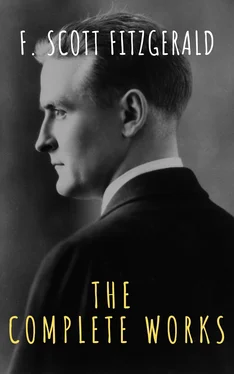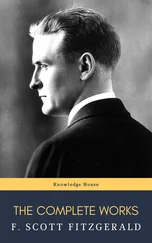Array The griffin classics - The Complete Works of F. Scott Fitzgerald
Здесь есть возможность читать онлайн «Array The griffin classics - The Complete Works of F. Scott Fitzgerald» — ознакомительный отрывок электронной книги совершенно бесплатно, а после прочтения отрывка купить полную версию. В некоторых случаях можно слушать аудио, скачать через торрент в формате fb2 и присутствует краткое содержание. Жанр: unrecognised, на английском языке. Описание произведения, (предисловие) а так же отзывы посетителей доступны на портале библиотеки ЛибКат.
- Название:The Complete Works of F. Scott Fitzgerald
- Автор:
- Жанр:
- Год:неизвестен
- ISBN:нет данных
- Рейтинг книги:5 / 5. Голосов: 1
-
Избранное:Добавить в избранное
- Отзывы:
-
Ваша оценка:
- 100
- 1
- 2
- 3
- 4
- 5
The Complete Works of F. Scott Fitzgerald: краткое содержание, описание и аннотация
Предлагаем к чтению аннотацию, описание, краткое содержание или предисловие (зависит от того, что написал сам автор книги «The Complete Works of F. Scott Fitzgerald»). Если вы не нашли необходимую информацию о книге — напишите в комментариях, мы постараемся отыскать её.
The first table of contents (at the very beginning of the ebook) lists the titles of all novels included in this volume. By clicking on one of those titles you will be redirected to the beginning of that work, where you'll find a new TOC that lists all the chapters and sub-chapters of that specific work.
The Complete Works of F. Scott Fitzgerald — читать онлайн ознакомительный отрывок
Ниже представлен текст книги, разбитый по страницам. Система сохранения места последней прочитанной страницы, позволяет с удобством читать онлайн бесплатно книгу «The Complete Works of F. Scott Fitzgerald», без необходимости каждый раз заново искать на чём Вы остановились. Поставьте закладку, и сможете в любой момент перейти на страницу, на которой закончили чтение.
Интервал:
Закладка:
And now in half an hour he would take the vows which pledged him forever to a life of service. Eighteen years of study—eighteen years where his every thought, every idea would be dictated to him, where his individuality, his psychical ego, would be effaced and he would come forth strong and firm to work and work and work. He felt strangely calm, happier in fact than he had been for days and months. Something in the fierce, pulsing heat of the sun likened itself to his own heart, strong in its decision, virile and doing its own share in the work, the greatest work. He was elated that he had been chosen, he from so many unquestionably singled out, unceasingly called for. And he had answered.
The words of the prayers seemed to run like a stream into his thoughts, lifting him up peacefully, serenely; and a smile lingered around his eyes. Everything seemed so easy; surely all life was a prayer. Up and down he walked. Then of a sudden something happened. Afterwards he could never describe it except by saying that some undercurrent had crept into his prayer, something unsought, alien. He read on for a moment and then it seemed to take the form of music. He raised his eyes with a start—far down the dusty road a group of negro hands were walking along singing, and the song was an old song that he knew:
We hope ter meet you in heavan whar we’ll
Part no mo’,
Whar we’ll part no mo’.
Gawd a’moughty bless you twel we
Me-et agin.
Something flashed into his mind that had not been there before. He felt a sort of resentment toward those who had burst in upon him at this time, not because they were simple and primitive, but because they had vaguely disturbed him. That song was old in his life. His nurse had hummed it through the dreamy days of his childhood. Often in the hot summer afternoons he had played it softly on his banjo. It reminded him of so many things: months at the seashore on the hot beach with the gloomy ocean rolling around him, playing with sand castles with his cousin; summer evenings on the big lawn at home when he chased fireflies and the breeze carried the tune over the night to him from the negro quarters. Later, with new words, it had served as a serenade—and now—well, he had done with that part of life, and yet he seemed to see a girl with kind eyes, old in a great sorrow, waiting, ever waiting. He seemed to hear voices calling, children’s voices. Then around him swirled the city, busy with the hum of men; and there was a family that would never be, beckoning him.
Other music ran now as undercurrent to his thoughts: wild, incoherent music, illusive and wailing, like the shriek of a hundred violins, yet clear and chord-like. Art, beauty, love and life passed in a panorama before him, exotic with the hot perfumes of world-passion. He saw struggles and wars, banners waving somewhere, voices giving hail to a king—and looking at him through it all were the sweet sad eyes of the girl who was now a woman.
Again the music changed; the air was low and sad. He seemed to front a howling crowd who accused him. The smoke rose again around the body of John Wycliffe; a monk knelt at a prie-dieu and laughed because the poor had not bread. Alexander VI pressed once more the poisoned ring into his brother’s hand, and the black-robed figures of the Inquisition scowled and whispered. Three great men said there was no God; a million voices seemed to cry, “Why! Why must we believe?” Then as in a crystal he seemed to hear Huxley, Nietzsche, Zola, Kant cry, “I will not”—He saw Voltaire and Shaw wild with cold passion. The voices pleaded “Why?” and the girl’s sad eyes gazed at him with infinite longing.
He was in a void above the world—the ensemble, everything called him now. He could not pray. Over and over again he said senselessly, meaninglessly, “God have mercy, God have mercy.” For a minute, an eternity, he trembled in the void and then—something snapped. They were still there, but the girl’s eyes were all wrong; the lines around her mouth were cold and chiselled and her passion seemed dead and earthy.
He prayed, and gradually the cloud grew clearer; the images appeared vague and shadowy. His heart seemed to stop for an instant and then—he was standing by the bank and a bell was tolling five. The reverend superior came down the steps and toward him.
“It is time to go in.”
The man turned instantly.
“Yes, Father, I am coming.”
II.
The novices filed silently into the chapel and knelt in prayer. The blessed sacrament in the gleaming monstrance was exposed among the flaming candles on the altar. The air was rich and heavy with incense. The man knelt with the others. A first chord of the Magnificat, sung by the concealed choir above, startled him; he looked up. The late afternoon sun shone through the stained glass window of St. Francis Xavier on his left and fell in red tracery on the cassock of the man in front of him. Three ordained priests knelt on the altar. Above them a huge candle burned. He watched it abstractedly. To the right of him a novice was telling his beads with trembling fingers. The man looked at him. He was about twenty-six with fair hair and green-grey eyes that darted nervously around the chapel. They caught each other’s eye, and the elder glanced quickly at the altar candle as if to draw attention to it. The man followed his eye, and as he looked he felt his scalp creep and tingle. The same unsummoned instinct filled him that had frightened him half an hour ago on the bank. His breath came quicker. How hot the chapel was. It was too hot, and the candle was wrong—wrong—everything suddenly blurred. The man on his left caught him.
“Hold up,” he whispered. “They’ll postpone you. Are you better? Can you go through with it?”
He nodded vaguely and turned to the candle. Yes, there was no mistake. Something was there; something played in the tiny flame, curled in the minute wreath of smoke. Some evil presence was in the chapel, on the very altar of God. He felt a chill creeping over him, though he knew the room was warm. His soul seemed paralyzed, but he kept his eyes riveted on the candle. He knew that he must watch it. There was no one else to do it. He must not take his eyes from it. The line of novices rose, and he mechanically reached his feet.
“ Per omnia saecula, saeculorum . Amen.”
Then he felt suddenly that something corporeal was missing—his last earthly support. He realized what it was. The man on his left had gone out, overwrought and shaken. Then it began. Something before had attacked the roots of his faith; had matched his world-sense against his God-sense; had brought, he had thought, every power to bear against him; but this was different. Nothing was denied, nothing was offered. It could best be described by saying that a great weight seemed to press down upon his innermost soul, a weight that had no essence, mental or physical. A whole spiritual realm, evil in its every expression, engulfed him. He could not think, he could not pray. As in a dream he heard the voices of the men beside him singing, but they were far away, farther away from him than anything had ever been before. He existed on a plane where there was no prayer, no grace; where he realized only that the forces around him were of hell and where the single candle contained the essence of evil. He felt himself alone pitted against an infinity of temptation. He could bring no parallel to it in his own experience or any other. One fact he knew: one man had succumbed to this weight and he must not—must not. He must look at the candle and look and look until the power that filled it and forced him into this plane died forever for him. It was now or not at all.
He seemed to have no body, and even what he had thought was his innermost self was dead. It was something deeper that was he, something that he had never felt before. Then the forces gathered for one final attack. The way that the other novice had taken was open to him. He drew his breath quickly and waited and then the shock came. The eternity and infinity of all good seemed crushed, washed away in an eternity and infinity of evil. He seemed carried helplessly along, tossed this way and that—as in a black limitless ocean where there is no light and the waves grow larger and larger and the sky darker and darker. The waves were dashing him toward a chasm, a maelstrom everlastingly evil, and blindly, unseeingly, desperately he looked at the candle, looked at the flame which seemed like the one black star in the sky of despair. Then suddenly he became aware of a new presence. It seemed to come from the left, seemed consummated and expressed in warm, red tracery somewhere. Then he knew. It was the stained window of St. Francis Xavier. He gripped at it spiritually, clung to it and with aching heart called silently for God.
Читать дальшеИнтервал:
Закладка:
Похожие книги на «The Complete Works of F. Scott Fitzgerald»
Представляем Вашему вниманию похожие книги на «The Complete Works of F. Scott Fitzgerald» списком для выбора. Мы отобрали схожую по названию и смыслу литературу в надежде предоставить читателям больше вариантов отыскать новые, интересные, ещё непрочитанные произведения.
Обсуждение, отзывы о книге «The Complete Works of F. Scott Fitzgerald» и просто собственные мнения читателей. Оставьте ваши комментарии, напишите, что Вы думаете о произведении, его смысле или главных героях. Укажите что конкретно понравилось, а что нет, и почему Вы так считаете.












